八下Unit 7 Topic 2 Cooking is fun!Section B
文档属性
| 名称 | 八下Unit 7 Topic 2 Cooking is fun!Section B | 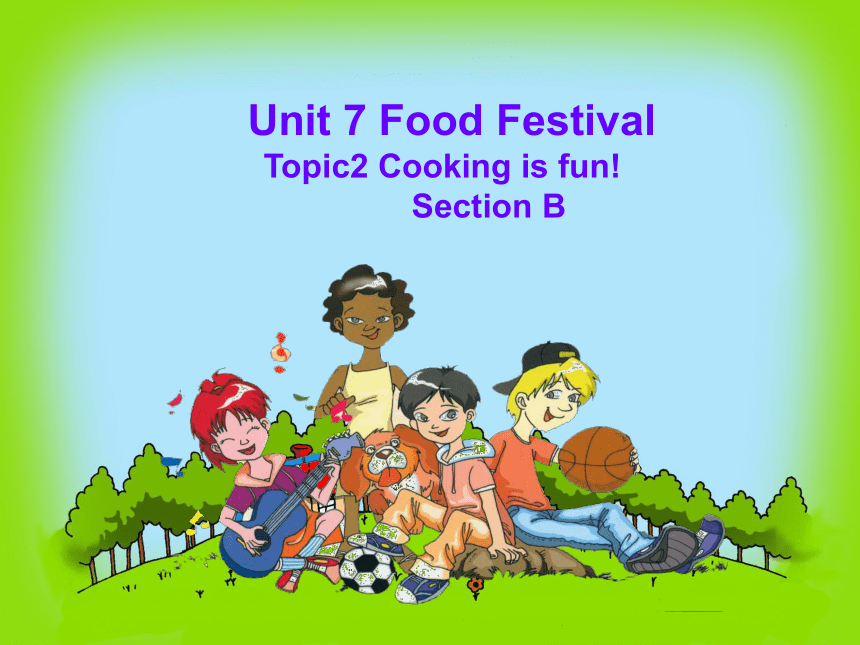 | |
| 格式 | rar | ||
| 文件大小 | 4.6MB | ||
| 资源类型 | 教案 | ||
| 版本资源 | 仁爱科普版 | ||
| 科目 | 英语 | ||
| 更新时间 | 2011-03-04 15:15:00 | ||
图片预览

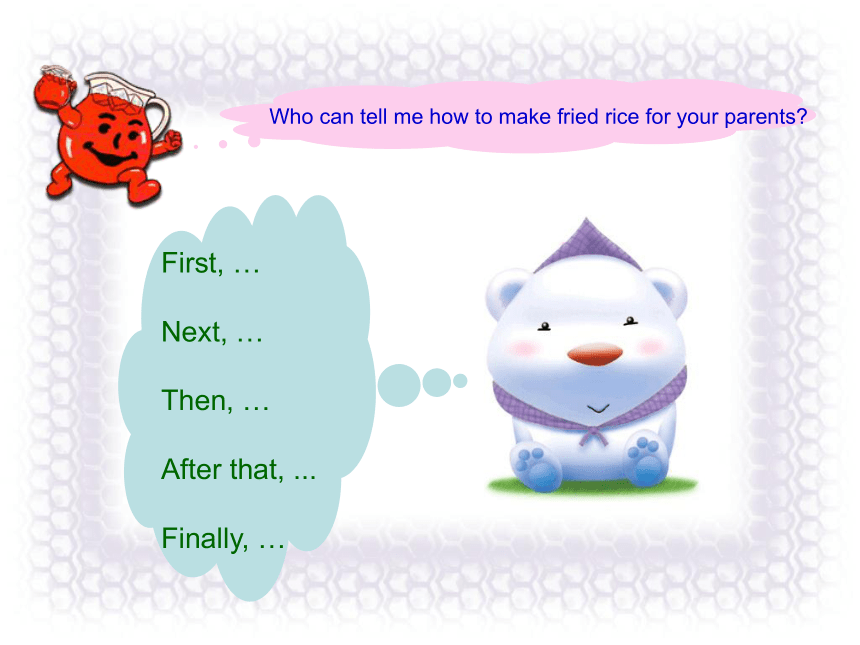
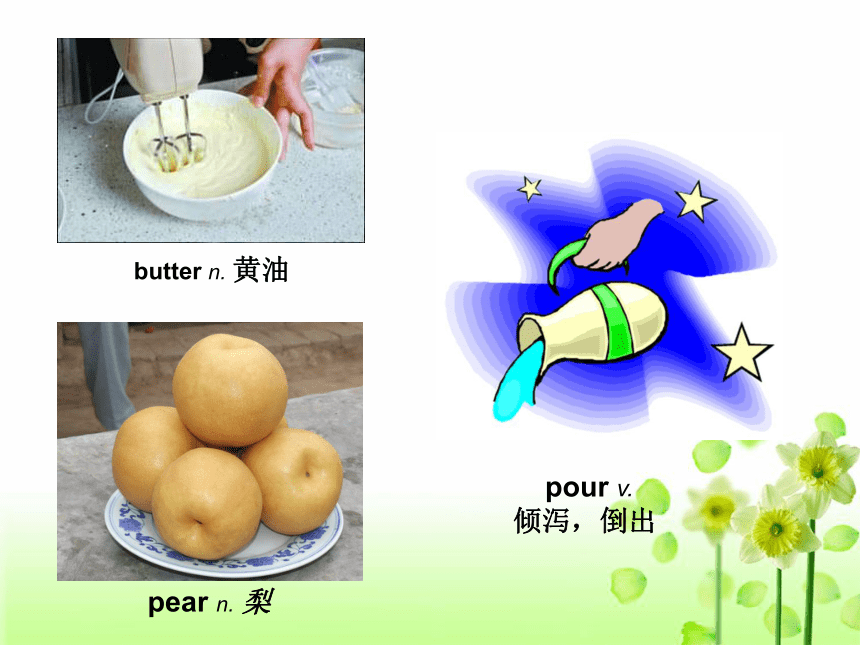
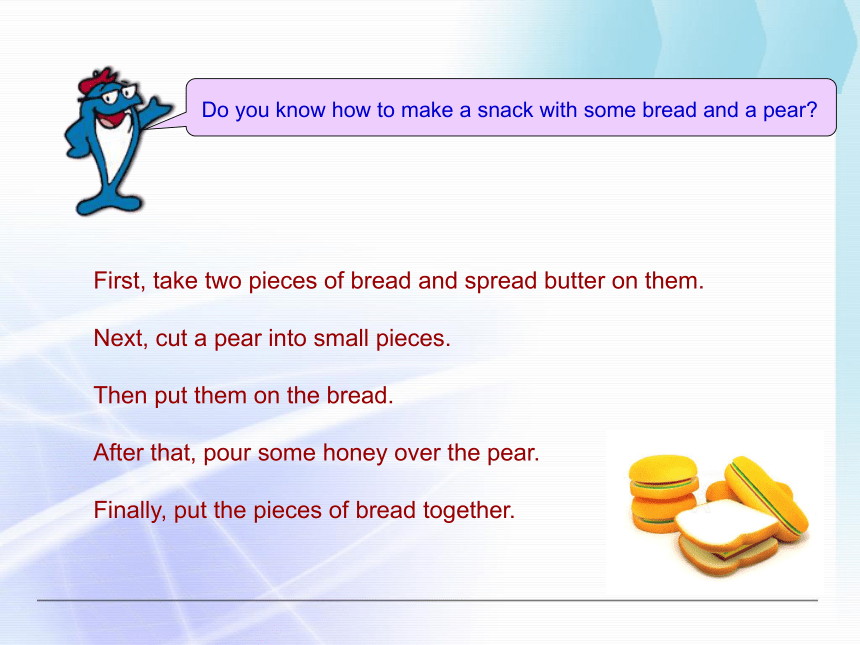
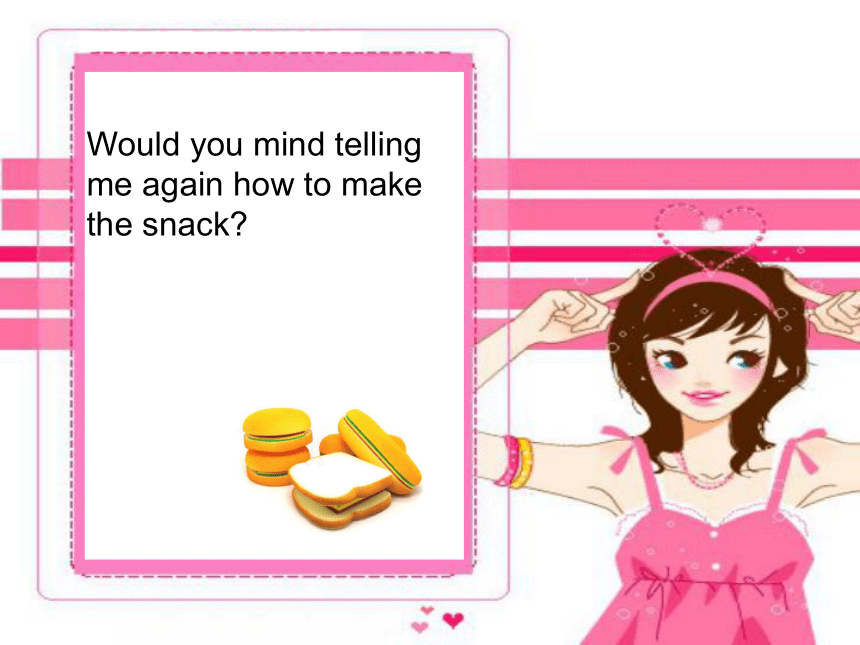
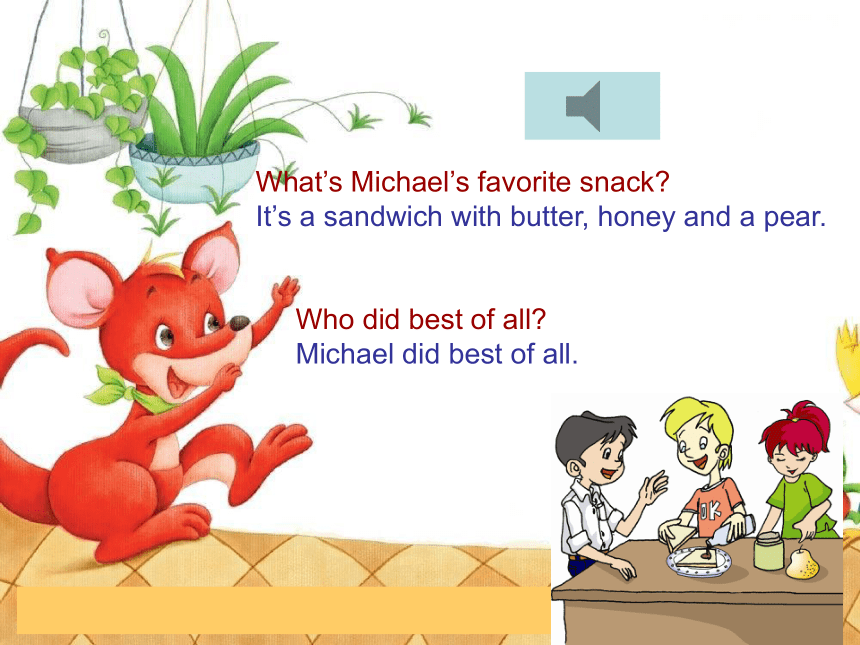
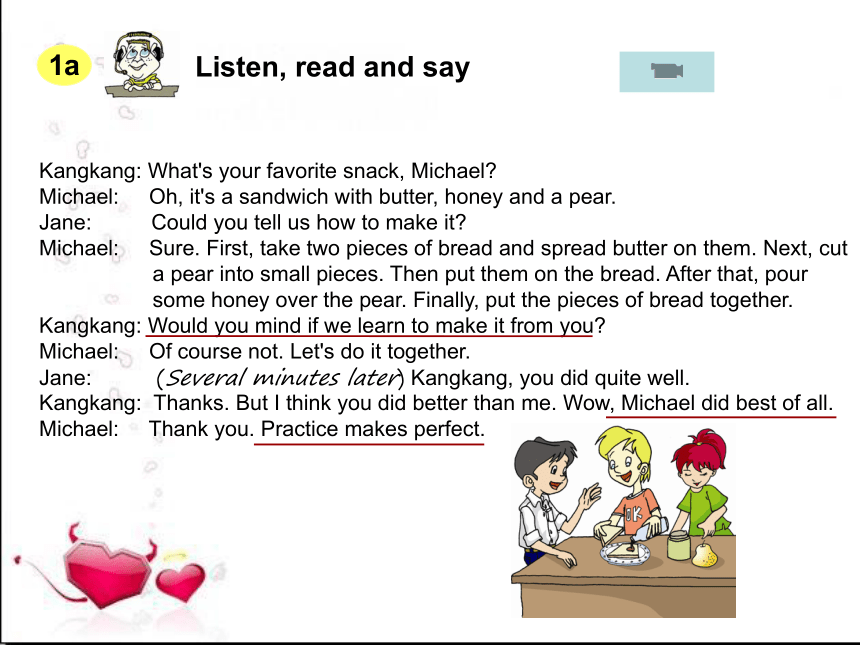
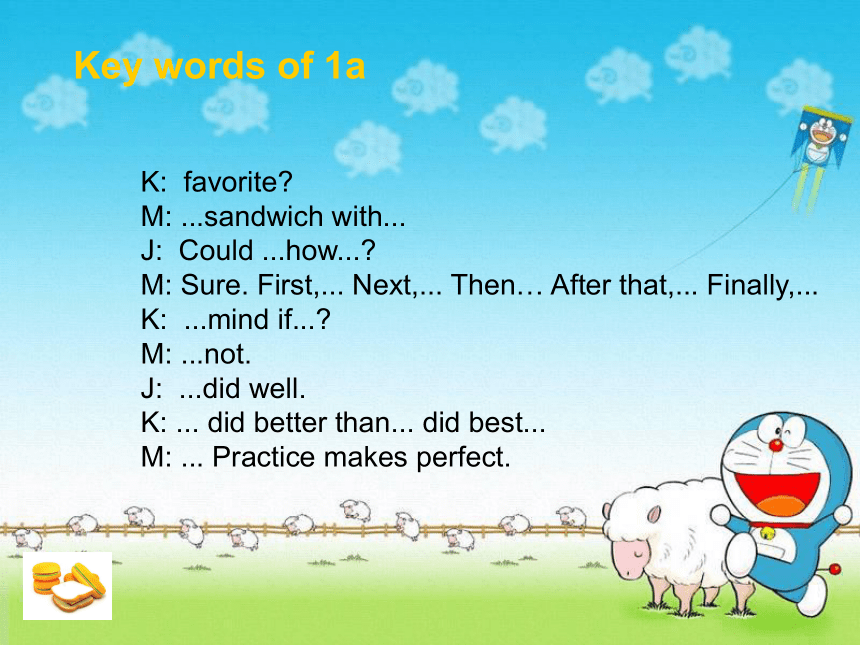
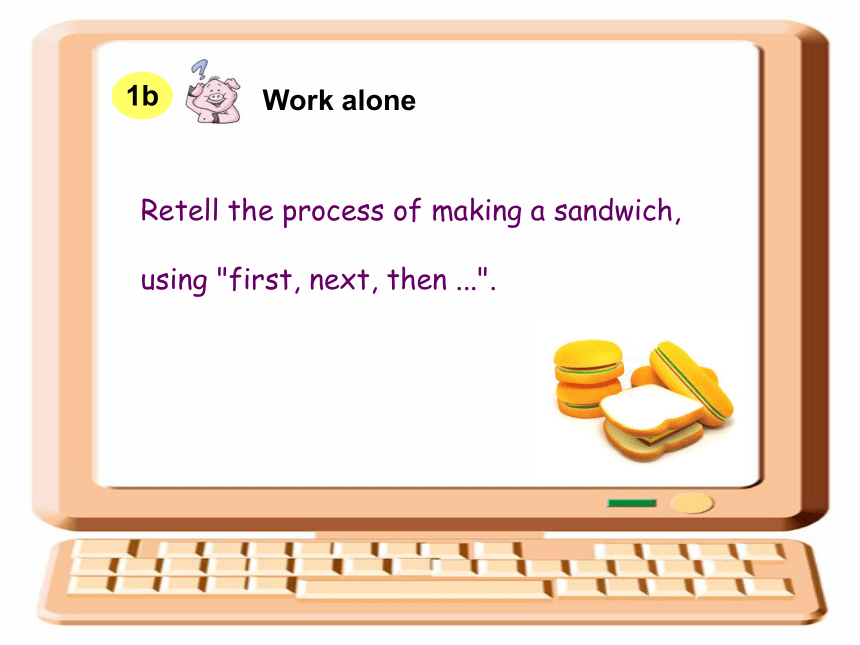
文档简介
课件22张PPT。 Unit 7 Food Festival
Topic2 Cooking is fun!
Section BWho can tell me how to make fried rice for your parents? First, …
Next, …
Then, …
After that, ...
Finally, … butter n. 黄油pear n. 梨 pour v.
倾泻,倒出First, take two pieces of bread and spread butter on them.
Next, cut a pear into small pieces.
Then put them on the bread.
After that, pour some honey over the pear.
Finally, put the pieces of bread together.Do you know how to make a snack with some bread and a pear?Would you mind telling
me again how to make
the snack?What’s Michael’s favorite snack?
It’s a sandwich with butter, honey and a pear.
Who did best of all?
Michael did best of all.1aListen, read and sayKangkang: What's your favorite snack, Michael?
Michael: Oh, it's a sandwich with butter, honey and a pear.
Jane: Could you tell us how to make it?
Michael: Sure. First, take two pieces of bread and spread butter on them. Next, cut
a pear into small pieces. Then put them on the bread. After that, pour
some honey over the pear. Finally, put the pieces of bread together.
Kangkang: Would you mind if we learn to make it from you?
Michael: Of course not. Let's do it together.
Jane: (Several minutes later) Kangkang, you did quite well.
Kangkang: Thanks. But I think you did better than me. Wow, Michael did best of all.
Michael: Thank you. Practice makes perfect.Key words of 1a K: favorite?
M: ...sandwich with...
J: Could ...how...?
M: Sure. First,... Next,... Then… After that,... Finally,...
K: ...mind if...?
M: ...not.
J: ...did well.
K: ... did better than... did best...
M: ... Practice makes perfect.1bWork aloneRetell the process of making a sandwich,
using "first, next, then ...".1cWork aloneLook at the pictures and match the parts of the sentences.
(On Saturday, the children are preparing for the food festival on the playground.)Michael arrives early.
Kangkang arrives earlier.
Jane arrives earliest.
Michael works hard.
Kangkang works harder.
Jane works hardest.
Michael leaves late.
Kangkang leaves later.
Jane leaves latest. polite adj.
有礼貌的,有教养的 impolite adj.
不礼貌的, 粗鲁的noisily adv. 喧闹地e.g.:The pile of books flopped noisily onto the floor.
那摞书劈里啪啦地散落到地上. spoon n.
匙,调羹 fork n.
叉,餐叉chopstick n.
筷子2aListen, read and sayMaria: Come on, Kumiko! Help yourself to some soup.
Kumiko: OK. Mm, it’s delicious. (Slurp! )
Maria: Kumiko, is it too hot?
Kumiko: No, why?
Maria: Well, in Cuba, it’s impolite to eat so noisily.
I don’t know if it’s polite in Japan.
Kumiko: Oh. In Japan, it’s polite to do that. It means you
like the food very much!
Maria: OK, let me try. (Slurp! )
Kumiko: Not bad, Maria. □ eat noisily.
□ speak loudly during a meal.
It’s polite/impolite +to □ smoke during a meal.
□ eat with your arms or elbows on the table.
…Discuss whether it’s polite or impolite to eat in China in the
following manners.Group workbcdA: Can you tell me if it’s polite to eat with your arms or elbows on the table in America?
B: Yes, I can. ___________
A: Do you know whether or not it’s impolite to smoke during a meal in France?
B: Yes, I do.______________
A: We know people use a spoon and a fork to eat in Thailand. Do you know whether they use knives?
B: Yes, I do. _______________________
A: I know Indians eat with their right hands. I don’t know if there’s no need for knives, forks or
chopsticks.
B: No, _______________It’s not impolite.They don’t use knives at all.There’s no need.It’s impolite.2bWork aloneabcda宾语从句if /whether 引导宾语从句时指“是否” 如:
1. I don’t know if/whether I need to obey all the rules while I’m
having dinner with my friends.
2. Could you tell me if/whether it’s polite to speak loudly at the
table?
3. I don’t know if/whether you are right.
Discuss the table manners in China, and then report them in class.Activities( ) 1. I don’t know ____ he is right or not.
A. that B. whether C. if
( ) 2. Which one goes ____, the car, the train or the plane?
A. fast B. faster C. fastest
( ) 3. It’s very kind ____ you to help me with my English.
A. for B. with C. of
( ) 4. Please ____ the ham and green onions finely, then add them to the
bread.
A. cut up B. cut into C. cut in
( ) 5. I don’t know ____ it’s polite or not to eat with our arms or elbows on
the table in America.
A. if B. whether C. that
( ) 6. ---Would you mind if I learn English from you?
---__________. I am very glad to teach you.
A. Of course not. B. You’d better not. C. Sounds great. Exercises in class单项选择。BCCABASummary1. Learn some new words:
butter, pear, piece, polite, spoon, fork, chopstick
2. Go on learning object clauses with if/whether:
Can you tell me if it’s polite to eat with your arms or elbows on the table in America?
Do you know whether they use knives?
I don’t know if there’s no need for knives, forks or chopsticks.
3. Social communications:
(1) Asking for permission:
Would you mind if we learn to make it from you?
(2) Having meals:
Help yourself to some soup.
4. Emotions:
Be able to understand the others’ feelings in communication.Homework1.Talk about table manners in different countries.
2.Make a sandwich or a hamburger.Bye-bye!
Topic2 Cooking is fun!
Section BWho can tell me how to make fried rice for your parents? First, …
Next, …
Then, …
After that, ...
Finally, … butter n. 黄油pear n. 梨 pour v.
倾泻,倒出First, take two pieces of bread and spread butter on them.
Next, cut a pear into small pieces.
Then put them on the bread.
After that, pour some honey over the pear.
Finally, put the pieces of bread together.Do you know how to make a snack with some bread and a pear?Would you mind telling
me again how to make
the snack?What’s Michael’s favorite snack?
It’s a sandwich with butter, honey and a pear.
Who did best of all?
Michael did best of all.1aListen, read and sayKangkang: What's your favorite snack, Michael?
Michael: Oh, it's a sandwich with butter, honey and a pear.
Jane: Could you tell us how to make it?
Michael: Sure. First, take two pieces of bread and spread butter on them. Next, cut
a pear into small pieces. Then put them on the bread. After that, pour
some honey over the pear. Finally, put the pieces of bread together.
Kangkang: Would you mind if we learn to make it from you?
Michael: Of course not. Let's do it together.
Jane: (Several minutes later) Kangkang, you did quite well.
Kangkang: Thanks. But I think you did better than me. Wow, Michael did best of all.
Michael: Thank you. Practice makes perfect.Key words of 1a K: favorite?
M: ...sandwich with...
J: Could ...how...?
M: Sure. First,... Next,... Then… After that,... Finally,...
K: ...mind if...?
M: ...not.
J: ...did well.
K: ... did better than... did best...
M: ... Practice makes perfect.1bWork aloneRetell the process of making a sandwich,
using "first, next, then ...".1cWork aloneLook at the pictures and match the parts of the sentences.
(On Saturday, the children are preparing for the food festival on the playground.)Michael arrives early.
Kangkang arrives earlier.
Jane arrives earliest.
Michael works hard.
Kangkang works harder.
Jane works hardest.
Michael leaves late.
Kangkang leaves later.
Jane leaves latest. polite adj.
有礼貌的,有教养的 impolite adj.
不礼貌的, 粗鲁的noisily adv. 喧闹地e.g.:The pile of books flopped noisily onto the floor.
那摞书劈里啪啦地散落到地上. spoon n.
匙,调羹 fork n.
叉,餐叉chopstick n.
筷子2aListen, read and sayMaria: Come on, Kumiko! Help yourself to some soup.
Kumiko: OK. Mm, it’s delicious. (Slurp! )
Maria: Kumiko, is it too hot?
Kumiko: No, why?
Maria: Well, in Cuba, it’s impolite to eat so noisily.
I don’t know if it’s polite in Japan.
Kumiko: Oh. In Japan, it’s polite to do that. It means you
like the food very much!
Maria: OK, let me try. (Slurp! )
Kumiko: Not bad, Maria. □ eat noisily.
□ speak loudly during a meal.
It’s polite/impolite +to □ smoke during a meal.
□ eat with your arms or elbows on the table.
…Discuss whether it’s polite or impolite to eat in China in the
following manners.Group workbcdA: Can you tell me if it’s polite to eat with your arms or elbows on the table in America?
B: Yes, I can. ___________
A: Do you know whether or not it’s impolite to smoke during a meal in France?
B: Yes, I do.______________
A: We know people use a spoon and a fork to eat in Thailand. Do you know whether they use knives?
B: Yes, I do. _______________________
A: I know Indians eat with their right hands. I don’t know if there’s no need for knives, forks or
chopsticks.
B: No, _______________It’s not impolite.They don’t use knives at all.There’s no need.It’s impolite.2bWork aloneabcda宾语从句if /whether 引导宾语从句时指“是否” 如:
1. I don’t know if/whether I need to obey all the rules while I’m
having dinner with my friends.
2. Could you tell me if/whether it’s polite to speak loudly at the
table?
3. I don’t know if/whether you are right.
Discuss the table manners in China, and then report them in class.Activities( ) 1. I don’t know ____ he is right or not.
A. that B. whether C. if
( ) 2. Which one goes ____, the car, the train or the plane?
A. fast B. faster C. fastest
( ) 3. It’s very kind ____ you to help me with my English.
A. for B. with C. of
( ) 4. Please ____ the ham and green onions finely, then add them to the
bread.
A. cut up B. cut into C. cut in
( ) 5. I don’t know ____ it’s polite or not to eat with our arms or elbows on
the table in America.
A. if B. whether C. that
( ) 6. ---Would you mind if I learn English from you?
---__________. I am very glad to teach you.
A. Of course not. B. You’d better not. C. Sounds great. Exercises in class单项选择。BCCABASummary1. Learn some new words:
butter, pear, piece, polite, spoon, fork, chopstick
2. Go on learning object clauses with if/whether:
Can you tell me if it’s polite to eat with your arms or elbows on the table in America?
Do you know whether they use knives?
I don’t know if there’s no need for knives, forks or chopsticks.
3. Social communications:
(1) Asking for permission:
Would you mind if we learn to make it from you?
(2) Having meals:
Help yourself to some soup.
4. Emotions:
Be able to understand the others’ feelings in communication.Homework1.Talk about table manners in different countries.
2.Make a sandwich or a hamburger.Bye-bye!
同课章节目录
- Unit 5 Feeling excited
- Topic 1 You look excited
- Topic 2 I’m feeling better now.
- Topic 3 Many things can affect our feelings.
- Unit 6 Enjoying Cycling
- Topic 1 We're going on a three-day visit to Mount
- Topic 2 How about exploring Tian’anmen Square?
- Topic 3 Bicycle riding is good exercise.
- Unit 7 Food festival
- Topic 1 We’re preparing for a food festival.
- Topic 2 I’m not sure whether I can cook it well.
- Topic 3 I Cooked the Most Successfully
- Unit 8 Our Clothes
- Topic 1 We will have a class fashion show.
- Topic 2 We can design our own uniforms.
- Topic 3 He said the fashion show was wonderful.
